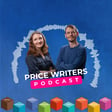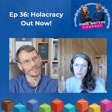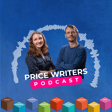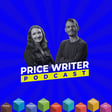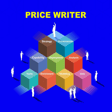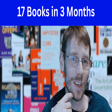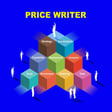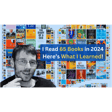Become a Creator today!Start creating today - Share your story with the world!
Start for free
00:00:00
00:00:01

Inspiration by Numbers on the Price Writers Podcast Episode 31
This week, Jeremy and Catrin share their top book picks for aspiring pricing professionals, or anyone who loves a great science or stats read. Catrin recommends three accessible books to spark curiosity (Storm in a Teacup), sharpen data communication (How to Lie with Statistics), and master problem-solving (Thinking Mathematically). Along the way, they debate dust jackets, spilt coffee science, and why hobbies reveal hiring potential. Jeremy also gives a shoutout to Catrin’s book as a must-read. Plus, a teaser for the next episode’s Indie Book Award highlights! Listen now for insights (and a few laughs).
Price Writers transforms pricing professionals into the most respected leaders in insurance.
Find out more at www.PriceWriters.com
Transcript
Introduction to PriceWriter Podcast
00:00:00
Speaker
Oh yeah, we can talk. We can talk.
00:00:12
Speaker
Welcome to the PriceWriter podcast with Katrin Townsend and me, Jeremy Keating. Join us as we explore and discuss the world of insurance-related books, offering our insights, recommendations, and crucially, how to apply these to pricing roles.
Summer Heat & Recommended Books
00:00:28
Speaker
So it's officially summer. It's proper hot today. So I think it's close to 30 degrees and I'm sat here with the window closed because I am recording. So you might know someone who has finished exams recently. So maybe one of children, a niece or nephew or a friend of the family, and possibly they're looking for some beginner level maths and statistics books to encourage them onto the next stage.
00:00:49
Speaker
Katrin has chosen three to share with us and I hope you will share them with others who are just starting out on their mathematical
Shift in Education Focus
00:00:58
Speaker
careers as well. So, hi Katrin.
00:01:00
Speaker
Hi Jeremy. Hello. So, there are a lot of popular science and maths and statistics books out there. How did you choose the three? Well, i think, firstly, I chose books I've already read myself. So, you are getting personal recommendations from me.
00:01:19
Speaker
But I think that when we think about what we want from graduates and young people nowadays, that education is a lot less about memorizing stuff, ah particularly with AI. We just don't need to memorize as much anymore. The information is already out there.
00:01:34
Speaker
So it's more about the, I guess, the attributes or the way you think about things. Yeah. And so I've chosen three books that I think represent key attributes that you need for STEM subjects or general insurance pricing as well. I think they're really key.
00:01:51
Speaker
So I've chosen Curiosity. state Communication through data, using data to relay a message. And also say problem solving.
Encouraging Curiosity in Learning
00:02:01
Speaker
How do you approach problems? And what do you do when you get a really tricky problem that might not be solvable with the tools you already have?
00:02:10
Speaker
So those are the three attributes that I thought were really important to you. They sound good to me. The, um I mean, the problem solving attitude is an interesting one. So my daughter is studying for 11 plus at the moment, and I need to teach her that it's okay not to know stuff.
00:02:26
Speaker
What you need to do when you don't know stuff is try to work out how to solve it. Whereas she gets a little bit despairing at the moment and it's a bit, oh, I don't know how to do it. And she gets upset. but actually it's like she's going to the wrong part of her brain should be going to the part of her brain that is i don't know this but what can i do about it and curiosity is a good one as well i think um we should think about employing people that are more curious about things we talk about let's um ask people about their hobbies and wider interests and things like that but often I perhaps feel it doesn't necessarily go anywhere.
00:02:58
Speaker
actually thinking about what people are like in the sense of whether they're curious people and problem solving people, not just at work, but outside in their own lives could be quite quite a useful approach. Yeah, I do think actually that talking about hobbies tells you tells you quite a lot about person though. I actually
Hobbies in Interviews
00:03:14
Speaker
really like it. Not only does it put people at ease, obviously is my ah softball interview question, but one of the best graduates I've ever hired was someone who ran their own sneaker a reselling business.
00:03:27
Speaker
When he talks about that, he told me everything that I needed to know. You know, he understood profit. He understood how to make ah a viable business. And he understood what he would need, what the ingredients were for pricing to get it right. So, um and I just thought it showed a lot of drive. so I do think that hobbies can be a really, really powerful way to communicate something about yourself.
Communicating Data Effectively
00:03:50
Speaker
But definitely if you're in an interview and someone asks about your hobbies, do know that they don't actually care what your hobbies are. They kind of want to hear more about about what that says about you as a person. um So I think some people kind of maybe misinterpret the hobby question. Yeah, I think so.
00:04:09
Speaker
I think i feel also say the whole school system doesn't really tell people why it's a good idea to have hobbies. It's a bit like, make sure you've got very wide stuff on your career so you seem very interesting.
00:04:20
Speaker
And i think communication through data is always a useful skill. I think that's probably one of the trickiest ones that people can, if talking graduates, often people don't come in with the best skills in that regard. So what is the first book, Katrin?
Introduction to 'Storming Teacups'
00:04:35
Speaker
Yeah, the most accessible book on this list is called Storming Teacup by Helen Szerzky. It has got such a gorgeous cover. Do you know, this actually might be one of the most controversial things I ever say this podcast.
00:04:47
Speaker
Okay. don't like dust jackets. Oh, I don't either. I always just take them off. Yeah. Those in the bin. But, yeah he so but how I got this book and the dust jacket is white and has a little teacup on the front.
00:05:01
Speaker
And a lot of people realise that when you take the dust jacket off, it has a little cutout and you see this swirly pattern, but underneath it's this gorgeous swirly pattern. Best to put it in front of your face. Yeah. Cause yeah.
00:05:12
Speaker
How gorgeous is this pattern? isn That is, oh yeah, I can see it. That is gorgeous. Sort of fractally, isn't it? It's absolutely gorgeous. Full marks for the actual book itself.
00:05:25
Speaker
um It's about 300 pages, but it is really accessible. is It's fun. And it jumps between biology, chemistry, physics. So all the sciences, but in a really yeah logical way. You're never left thinking, wait, what is going on here?
00:05:42
Speaker
It's perfect probably for anyone in high school above, so maybe 11 plus, that kind of age. Or to be honest, anyone who really fond memories of high school science class, if you want to just feel inspired again, I totally bet for you.
00:05:54
Speaker
As an example, one of the chapters is all about air pressure and she talks about the basics of how air pressure works and boils law. But then she relates that to why does popcorn pop?
00:06:07
Speaker
Other groans don't. And also, when a whale dives deep underwater, how does the weight of the water not crush them totally? How do they manage to live? I don't know. and So you can see how she's jumping around between the ah physics and then the biology and then she kind of jumps back into chemistry again.
00:06:27
Speaker
It's really interesting. And the theme that just runs through it all is curiosity about the world around us. So it might actually get you like purposely spilling your coffee to investigate surface tension, spinning eggs to look at momentum or making popcorn, you know, as a science experiment. So yeah, a really, really fun
Curiosity in Professional Development
00:06:47
Speaker
read. And all those things that you're like, well, I just know that popcorn pops. That's fine. If you never really thought that deeply about why, job that happens?
00:06:54
Speaker
but it Is there anything more dreadful in an office when you hear that unmistakable noise of a drink being spilled and people suddenly running into a panic? I don't think I'll be spilling a drink on purpose, be honest. That's sort thing that makes me really twitchy.
00:07:09
Speaker
yeah But I would say ah curiosity is really important, actually. We we touched on it just now, but definitely for people in team being interested in data and what you can find out.
00:07:20
Speaker
And actually often when we ask people to investigate things and come back with recommendations, they doing an impact analysis and so on. It's good in those circumstances actually suggest that people are a bit more curious about what they could do.
00:07:34
Speaker
So the coffee thing is that basically if you spill coffee, you know you know when you spill coffee, it leaves like a brown line at the very outside. Yeah. And she was like, why does that make a uniformly brown spill mark? Yeah, a good idea.
00:07:47
Speaker
why is that? Well, it's all because of surface tension. And this works with instant as well as fancy coffee. Okay. Spill whatever you want. But the idea is is that the liquid wants to retain the same surface tension, in the same shape.
00:08:00
Speaker
So as the liquid evaporates from the edges, it's going to evaporate from there first because it's got more surface area. Yeah. More of that liquid is going to rush back to the outside and it's going to get progressively more coffee concentrated as more of the water evaporates. So basically that's what it is.
00:08:18
Speaker
Anyway, it's so fun, isn't it? It is actually a fun boat. It does look really fun actually. When when I saw it on your list, I was actually like, oh, I've seen that before, but never read it. And I've not read much Popular Science for Ages. And it looks like a really interesting one I saw the blurb said something about, are you curious about these things? And I was immediately going, oh, I'm curious about these things actually.
00:08:38
Speaker
I'll tell you one I always find funny. I'm saying this coming in the book. But the buoyancy of ships, particularly like
Critical Thinking with Daryl Huff
00:08:44
Speaker
you see big battleships with very sharp and distinct hull downwards.
00:08:48
Speaker
And I look at them and I understand buoyancy in like the science part of my brain. But the the the sort of everyday part of my brain is just like that should just fall over. That should not stay up or just go straight down. How does that should not work?
00:09:03
Speaker
Like that's millions, like thousands of tons of battleship and it should just... um Sing down. say Catrin, what's the big thing you want a young person to take away from it? I mean, this book is just an exercise in curiosity.
00:09:17
Speaker
So, I mean, to be honest, if it's your own child, then expect them to want to start making popcorn. It's really fun. There's a lot of experiments that you can do in your own kitchen, um lot of animal-related kind of questions. You're probably going to get a whole load of why, why, why questions. Yeah, brilliant.
00:09:34
Speaker
ah But I think that's really it's really good. and and And as an adult, sometimes we just take for granted that... things work how they work because that's what we've been taught so I think this is a really good way to kind of reset your curiosity and see things with fresh eyes so that was the first book I do recommend it it's really exciting my second book is called How to Lie with sta Statistics by Daryl Huff it's a classic have you read it? yeah it's yeah right there classic yeah it's really short but it's a fun read for anyone who has a knowledge of mean mode medium as long as you've got that basic so probably year seven eight I don't know
00:10:10
Speaker
um So somewhere around then, if if you've got a 12 to 13 year old, they would find this. Probably fun. ah It's a little bit cheeky, as you can tell by the title. And it covers things like data visualization, summary statistics, different biases. And the book seems to be all about how to manipulate data and how to make it say anything you want it to say.
00:10:33
Speaker
But I think that's the genius of it. It's not just about... being false or being duplicitous. The book is really about what do you want to say with your data?
00:10:46
Speaker
And the whole book works on the premise that you know what it is you want as an outcome. And I think this is something that we don't do enough in insurance pricing actually. So often we'll say, all right, we're going to this meeting. I'll make this graph.
00:11:02
Speaker
Why? Well, because that's the graph that we always show in meetings. Why? Like, what is, why are we showing people that graph? I think we've all seen presentation where they put something on screen and they go, yeah, don't really have much to comment on this.
00:11:15
Speaker
Yeah. I mean, definitely had that. Why did you put it in the pack? Yeah, and I know. so Great. Good for you. um ah Another one people do is like, this is self-explanatory and it's not, it's it's for me who met like, it's for us. A lot of the audience don't even like graphs.
00:11:34
Speaker
Yeah, and so actually what I like about this book is, you know, obviously most people who are GCSE level or above are not going to find the manipulations in it but particularly novel.
00:11:47
Speaker
But what it does do is it reinforces you to think, why am i reaching Carissa to this thing here? Oh, and don't just say it so I can make a data-led decision.
00:11:58
Speaker
Why am I actually using a statistic? What outcome is it I'm trying to drive and how can I best use and display the statistics to get the outcomes?
00:12:09
Speaker
I think that's really important. Um, the kind of that manipulation process as part of communication, not just because I'm so fancy and I can use a dot describe or dot summarize, uh, but really why, why, why are we talking?
00:12:25
Speaker
I like that. I find it useful. Things from that book i actually see in everyday life even there. So I read it many years ago, but it did help me to know when I'm being manipulated by graphs and charts, which happens, I'm afraid, when stuff in the media.
00:12:39
Speaker
You see, it's sometimes in YouTube videos as well, but I remember a particular one. I won't say what it was about it's political, but they had done the scale, so the Y scale, the wrong way up. So it looked like...
00:12:52
Speaker
the thing was decreasing, but it wasn't, it was increasing. But at first glance, and that title the title was about income of this change in some laws to do decriminalization.
00:13:03
Speaker
And it was clearly the problem that got worse, but they didn't want to say that in the article. And it was just, it's just their face manipulation. yeah Yeah, I mean, not obviously in insurance pricing, don't do anything. But there is a real point there about what were you trying to communicate that yeah um And how can we try and make that super clear?
00:13:25
Speaker
I do really, I did agree. i shouted with Some of the examples from that book are about, you know, if you want to show something doubling, if you show it as a two dimensional picture instead of just on a graph, so say it's income, for example, instead of showing just a dot on a graph and showing it doubling, if you show it doubling in size, both on your x-axis and your y-axis is four times bigger visually, it's only double. There's things like that.
00:13:54
Speaker
and But i think I think that's a really good, actually, that's more important now than than it was when I first read it when I was teenager. you know Being critical ah about the statistics we encounter in the wild, especially with the increasing amount of AI slop and um nonsense on the i circulating the web now, being able to think critically about data and statistics As well as the intended reaction to it. What was the person trying to manipulate me into feeling?
00:14:27
Speaker
Just being aware of that, I think that's super important. Now, I'm saying now more than more than i when I read it 10 years ago. genius I think that's good actually I think particularly as you advance from your career you actually get in front of more and more people who are busier and busier and you do need to get to the point more often in in the work that you do so I think actually it's a good way of saying that um yes statistics are important but work out what ones are important and and what you want to say about it and and
00:14:57
Speaker
you know, think about how people are going to react with in the way that you actually present the information towards getting the reaction that you think is the right one and make sure you don't present it in a way that leads to the reaction you don't want, such as people immediately thinking, no, this is wrong, or I don't want to do that, or that's not a very good ah recommendation and so on.
00:15:21
Speaker
So what is the final bit, Catherine?
Problem-Solving with 'Thinking Mathematically'
00:15:24
Speaker
The third book that I picked was on the topic of problem solving and it's called Thinking Mathematically by John Mason and others.
00:15:33
Speaker
This was actually recommended pre-reading for my undergraduate course. So I read it the summer before I went to university. um Yes, I was the singular nerd who actually read the books. But what, in the reading list as well? I was like, what should I, you know, i yeah, you got all summer long.
00:15:51
Speaker
Like, they'd given you a list of books. so I read the books. Yeah, know. I didn't read all of them, but I did read this one. This one actually did look really good. And what really liked about it is that it's not a book that relates to one specific course that I did at university.
00:16:05
Speaker
It's a book that teaches you methods for structuring your thinking and thought processes, whether you're doing a mathematical proof or you're problem solving, it's teaching you a way to think about that problem. And I still use ideas from this book, even now.
00:16:24
Speaker
stra used one last week. The kind of questions it talks about are, if you're given a statement, is it true for really trivial cases, but zero, one, negative numbers? Is there an obvious counterexample where you're like, yeah, it's clearly not going to work.
00:16:44
Speaker
I think that pricing people could probably use this check a little bit more when we make price adjustments or when we make changes to our systems, do the trivial check.
00:16:56
Speaker
What would happen if something was input zero or genuinely how does our system deal with negative? All of that kind of thing. Really, really useful check. And obviously um very useful at undergraduate level as well.
00:17:09
Speaker
But the one I use even today is He sure talks about it in terms of a magic wand. If I had a magic wand, count what would help me solve this question? So imagine you are stuck on a problem.
00:17:27
Speaker
And it could be something like those technical interview questions that you often get, you know, estimate the number of I was in the UK Yeah We were too many We were in Boston Or whatever You know um Say it can even be a question It works for that But it also works For really really complicated Mathematical proofs And basically you You go as far as you can and you get stuck mean everyone's Everyone's been there right And you're like Yep.
00:17:53
Speaker
Cool. ah Where do i go next? And he says, imagine you've got a magic wand and you could get any piece of information right now. What would that be? And he suggests explicitly writing that out on a piece of paper.
00:18:06
Speaker
I would need to know... this, I would need to know, i don't know whether it's a formula, or but I last used this actually for project planning. So I was asked to come up with a ah long-term kind of six month project plan and ask whether something was possible.
00:18:23
Speaker
And the first answer was like, I have no idea because I've never actually done this specific activity, this specific part of it. If I had have done that specific task, then I'd be able to give you a much better estimate. so until that point, I don't know.
00:18:42
Speaker
So in that case, my magic wand was, if I knew exactly with certainty how much time it would take, then I would be able to solve this question. But I don't know yet.
00:18:52
Speaker
And I think why this is so useful both at an academic level or an insurance pricing is that so often we don't really know the answer and we're not that good at communicating certainty, you know, being able to say, well, look, I don't know. if I was sure on this one part of it, then I would be able to tell you with a good deal of certainty. But right now, that's where the uncertainty is. It's a really good communication tool, I think.
00:19:22
Speaker
It also helps you to communicate when you will be able to give a final answer. Say, well, you know, once I get this information and I'll get this information by doing X, Y, and search then you're going to have a much more cohesive answer. So I think whether you're an analyst doing some work and, for example, something open-ended, like a reconciliation, and your manager says, when will that be done?
00:19:49
Speaker
Yeah, it's a dreadful question though often, isn't it? Because particularly with reconciliations, because you don't know what you don't know. Yeah, I mean, how how long is this piece of string on that, right? So I i used to encourage analysts to say, well, once site I need to do these final summary checks and and work out where the issues are, but once I know how many issues there appear to be, then I can give you a much better estimate.
00:20:12
Speaker
So it can be a really good communication tool as well. And I think actually it's really useful for interviews. Like I say, if you've got those complicated interview questions and you get to the point where you're don't really know.
00:20:25
Speaker
Yeah. Call it something, call it C for cars and then say, right, well, I'll continue a question using the letter C and then you can just make an assumption and plug it in at the end.
00:20:35
Speaker
Like say, it's such a useful tool that I use all the time. I like the one, I especially like the one about taking the trivial cases actually. um this is something I did recently where I was trying to communicate about regulation, the most exciting subject possible, the regulation of pricing.
00:20:55
Speaker
But I was talking about how, for me, the extreme case is life assurance because it's very binary. You have a like acc claim may or may not occur, a large payout may or may not occur. So it's quite straightforward.
00:21:08
Speaker
And that's a really, actually a really good case. it you Even if you're taking concepts in general, just think about them in that very one zero binary case and whether actually what you're advocating would work well in that situation, then it potentially would work well in general insurance too.
00:21:25
Speaker
And communicating uncertainty, yes head don't, don't, doesn't everyone's, because there's a, there's a real problem there because you want people to think you've done good work. So as soon as you start telling them about all the problems with it, then you feel like you are making them less confident in the work.
00:21:41
Speaker
But actually it goes to the other extreme as well, where people start their presentation with a huge list of things that are wrong with the analysis they're about to deliver. And then to deliver the analysis is actually getting that balance right can be really very difficult.
00:21:54
Speaker
Well, the book I would most recommend to a young person thinking about a role in insurance pricing or even actuary of science or really insurance generally would be your book, Catherine.
Engaging Books for Young Insurance Enthusiasts
00:22:04
Speaker
So I've got my copy here, which usually lives on the shelf just behind me.
00:22:09
Speaker
And the reason I say that is because I think your book takes them through all the concepts they ought to know in insurance in a really digestible, lovely, easy to read way.
00:22:20
Speaker
I've told you before, ah but I'll tell the world as well. So I do not find capital requirements terribly exciting. So since qualifying as an actuary, I've probably tried to avoid really anything to do with setting capital requirements.
00:22:33
Speaker
except the bare minimum you have to do when you work an insurer. But actually, the chapter in your book, it opens talking about um how you don't like holding money. And it's just so engaging. It just really made me interested. And I actually read a whole chapter on Capital and enjoyed it.
00:22:51
Speaker
So, really good book. I do thoroughly recommend it. It is targeted really well at young people who are interested in it, as well as wider people that are interested as well. But do think particularly young people will take a lot away from your book.
00:23:03
Speaker
Yeah, it is actually the recommended pre-reading coupler. university courses for actual science and I think the maths and stats as well.
Katrin's Academic Journey
00:23:12
Speaker
So, you know, you might see it on a recommended reading list, but yeah, it's meant to be accessible.
00:23:16
Speaker
It's meant to be the book that I wish I could have read at this age. When I was trying to work out what wanted to do for career from between 12 and 17, I didn't really know what I wanted to do at university.
00:23:30
Speaker
And I was trying to figure all that out and I knew I loved maths. And I loved science as well. And it was more about, for me, trying to extend my own interest in it because, you school syllabuses now, they're short on time. They're only going to cover a certain amount of stuff.
00:23:48
Speaker
So let your reading and your curiosity take you to the next level. And so I read loads of maths and science and some statistics books during that age.
00:23:59
Speaker
And it just, I think that's what really got me into more of the problem solving side of it. It was by reading lots of popular science books that I thought, sure, not very good experiments. Yeah.
00:24:10
Speaker
Doing an experiment doesn't really interest me that much. Maybe one time on this podcast, I will share the book that changed my life, the book that ah made me finally just decide on my university degree.
00:24:26
Speaker
Maybe that's one for another. It's much longer book, and I really wouldn't recommend it younger readers. Okay. I just think I second my voice a bit more. Okay.
00:24:38
Speaker
A bit more of an intense only for a topic, I guess. But yeah, these three, super readable, super accessible. um but Hang on, Katrin, have you got your copy of your book with you?
00:24:48
Speaker
Yes. Always. Excellent. Over the face, they can see it.
00:24:55
Speaker
Excellent. Amazing. So they're three books that i read when I was a teenager. I don't know if anyone listening, we'd often have knew if you had a book you were given about that time.
00:25:06
Speaker
that particularly nurtures your interest in maths and science. So do post in the comments if we've missed a really great one.
Preview of Next Episode
00:25:13
Speaker
Next time, we'll be talking about the winners and finalists from the Next Generation Independent Book Awards.
00:25:21
Speaker
Jeremy, you, in fact, were a finalist in the Next Generation Independent Book Awards. Tell us just a little bit about what we could expect. That's right, Katrin. So we had the honor recently of going to Philadelphia, which was fantastic, had a really good time.
00:25:38
Speaker
And we collected my award at a wonderful awards ceremony for being a finalist in the business reference category. And we met many other authors in a wide genre of books,
00:25:49
Speaker
And we've picked a small number to talk about on the podcast, which we feel would be beneficial to pricing people. So not just business. We're looking at a wide range of books, which we think a pricing professional will find useful in their career.
00:26:05
Speaker
Yeah, you don't have to read them all. You can just listen to the podcast and take them tell me good stuff for that we say. Or maybe I'll help you pick up a knee and new book outside of your comfort zone.
00:26:16
Speaker
Why not let us read them for you and let you know which ones we think will benefit you? Absolutely. Well, thank you so much for joining us. We will see you next time.
Conclusion & Training Workshops
00:26:31
Speaker
PriceWriters transforms pricing professionals into the most respected leaders in insurance. Find out more about our engaging training, graduate schemes and workshops by visiting pricewriters.com.
